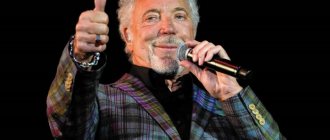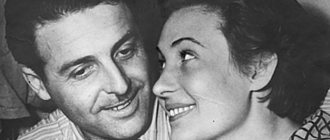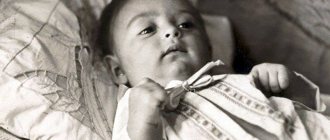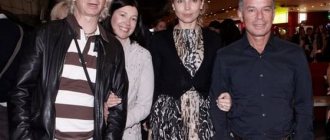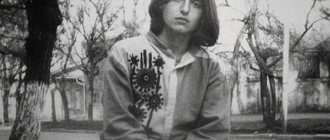Childhood and family of Eduard Khil
Edward's hometown is Smolensk.
Mom worked as an accountant, father was a mechanic. Unfortunately, he was raised only by his mother, as the family broke up. My childhood cannot be called happy; it happened during the war years. The kindergarten where Eduard was located was evacuated. He ended up in one of the orphanages in Ufa. The little boy saw the wounded there. The orphanages were starving, and many then died of hunger. However, Gil was lucky to survive. He remembers that, together with one of the students, he spoke to the wounded in the hospital. In 1943, Edward’s mother finally found him, and they went to Smolensk, which had been liberated by that time. The city was almost completely in ruins. In 1949, the teenager went to Leningrad, where he became a student at the printing college. After graduation, Eduard worked at an offset factory.
Eduard Gil, Mr. Trololo in his youth
While still in technical school, the student began visiting the opera studio of the Palace of Culture. He liked singing, so the young man enrolled in the preparatory department of the conservatory. In 1955, Eduard managed to realize his dream and become a student at the Leningrad Conservatory. He studied with Professor E. Olkhovsky at the vocal department. In addition, there he studied chamber singing and acting.
Personal life
In his youth, Eduard Khil married ballerina Zoya Pravdina. The singer lived with her all his life. The couple had a son in June 1963. Dmitry Khil followed in his father’s footsteps and connected his life with music. In 1997, Eduard Anatolyevich had a grandson, who was named in his honor.
Eduard Khil with his family | Grandfather
In 2014, the artist’s wife Zoya Khil starred in the TV show “Live” and talked about the details of her family life with the People’s Artist of the RSFSR. Khil’s grandson admitted in an interview that he was seriously considering entering the conservatory in the vocal department.
The first songs of Eduard Khil
While still studying, Khil performed in the opera studio of the conservatory, where he performed a number of leading opera roles.
In 1955, Eduard became a soloist of the Lenconcert Philharmonic Department, singing classical and ancient romances and folk songs. In 1960, he graduated from the conservatory and continued performing, including at the Opera Studio of the conservatory. Around that time, Gil became interested in pop songs. This happened after he saw the performance of K. Shulzhenko. Edward felt that pop songs made him worry, be sad, rejoice and smile. He saw that such performances captivated entire audiences.
Eduard Khil “Winter” Song of the Year - 1971 The singer first appeared in Moscow with pop songs in 1962. He was introduced by Leonid Utesov himself. It must be said that the performance turned out to be so successful that in the same year he received an invitation to the Second All-Russian Competition of Variety Artists and became a laureate. He performed the songs “Maritana”, “The Path to the Pier”, “The Story of Bagels”.
In 1965, Eduard became a participant in the Soviet Song Festival, where Utesov and Shulzhenko also performed. Thanks to his enormous success, the singer received a ticket to the international stage. Soon Khil went to the Sopot Festival, then to the Golden Rooster competition in Brazil.
The rise of a musical career
In 1965, Eduard Gil brought home a prize for second place in the international festival, which was held in Poland, and a diploma for fourth place in the Brazilian Golden Rooster competition. His career was successful, and 1968 brought the singer the title of Honored Artist of the RSFSR. In the early seventies, the pop singer’s repertoire included the song “At the Forest at the Edge” (Winter), which became one of his most famous compositions.
In 1973, Eduard Khil visited an international festival in Germany and also participated in a television revue in Sweden. The singer was one of the few Soviet artists touring the largest countries of the world. In 1974 he became People's Artist of the RSFSR.
In the eighties, Eduard Anatolyevich hosted his own television show “By the Fireplace”; he dedicated it to stories about the classics of Russian romance. Gil skillfully combined teaching and concert performances. The artist was often invited to serve on the jury of major song competitions. During Soviet times, the singer recorded his best hits, which are still popular and recognizable to this day.
Eduard Khil toured European countries and the USA. His performances were popular abroad among the children of Russian emigrants who left their homeland at the beginning of the 20th century. During the post-perestroika era, the artist lived in Europe for some time. Gil's concert on the stage of the Parisian cabaret "Rasputin" was a great success. Public attention led to the appearance in Paris of the singer's first CD, entitled “Le Temps de L'Amour” (“Time for Love”).
Eduard Khil's greatest hits
Khil quickly became popular in the Soviet Union, and he was known abroad.
In 1968, the singer was already an Honored Artist of the USSR. He worked with O. Feltsman, A. Pakhmutova, V. Solovyov-Sedy and others. Many young Leningrad composers wanted Khil to perform their works, as this was the key to recognition and development. The singer has always had a special creative style of performance, attracting attention with magnificent vocals, high artistry, and impeccable diction. He was equally good at folk songs, chamber repertoire and modern Soviet songs.
Eduard Khil: Trololo (original version) Khil became a regular participant in the festive “Ogonki”. All the best songs of the Soviet period are associated with him. In the seventies, foreign tours became frequent for him. Such Soviet pop stars as Valery Leontyev, Laima Vaikule, Valery Meladze and others performed on the same stage with Eduard Khil.
In the eighties, the singer hosted the “By the Fireplace” program on Leningrad Television. In it, he sang himself and invited conservatory students and the best professional performers. Khil was also a teacher at the Institute of Theater and Cinematography and taught at his native conservatory.
In the early nineties, after the dissolution of Lenconcert, the artist found himself in free float. He did not change his citizenship, but performed concerts abroad, where he remained popular among the first wave of emigrants. His performances in the Parisian cabaret “Rasputin” were especially successful. Since 1994, the artist began performing again in his country, and he continued performing abroad.
Biography[ | ]
Childhood[ | ]
According to widespread information, Eduard Khil was born on September 4, 1934 in Smolensk, however, according to Khil himself, he was born in 1933, but during the evacuation the documents were lost and when new documents were drawn up, the year of birth was given as 1934[3].
Eduard was born into the family of mechanic Anatoly Vasilyevich Eismont (1907-1973) and accountant Elena Pavlovna Kalugina (1907-1993). On his father's side, Edward had his grandfather Vasily Nilovich Eismont (1873-1938, headed the church choir, was repressed) and grandmother Feodora Georgievna Eismont (1880-1957, midwife). On his mother’s side, he had his grandfather Pavel Trofimovich Kalugin (1869–1935, participated in the construction of the White Sea Canal) and grandmother Alexandra Fominichna Kalugina (1875–1946, railway ticket cashier)[4].
The exact origin of the surname Gil is unknown. According to some sources, it is of Spanish origin, according to others, it has ancient Russian roots[5].
Eduard Khil's childhood, which occurred during the Great Patriotic War, was difficult. When Nazi Germany attacked the Soviet Union, Eduard lived in Smolensk with his mother and stepfather (his parents were already divorced at that time). The boy, along with other children, was evacuated literally an hour and a half before the city was captured by the Germans. Eduard ended up in an orphanage in the village of Raevsky near Ufa[4][6].
Edward was reunited with his parents only in 1943, when Smolensk was liberated from German occupation. When Elena found him, he was severely malnourished, was in a state of deep dystrophy and could not walk on his own. Elena managed to cure him, but later Edward had to endure another post-war famine. As a teenager, Edward smoked a lot, but quit at the age of 18, when he began to study vocals.
Studying in Leningrad[ | ]
In 1949, Eduard Khil sent several of his drawings to his uncle from Leningrad. He showed them to an artist friend, and he said that the boy has abilities, let him come and enter the Mukhinsky School. “I arrived, but it turned out that I had to study for seven years, and my uncle, who provided me with living space, found it very difficult even without me - he has his own large family. So I couldn’t sit on his neck for so many years. And instead of the Mukhinsky School, I entered the Leningrad Printing College, close to drawing, to paints, but to study for not so long,” said the artist. He also studied at the opera studio of the Palace of Culture. Kirov, worked as a foreman at an offset printing factory, was fond of painting, and studied at an evening school for music education.
In 1960 he graduated from the Leningrad Conservatory (singing class of E. G. Olkhovsky and Z. P. Lodiy) and began performing as a soloist of the Lenconcert [2]. Many years later, Eduard Khil led a festive concert, which was attended by Olkhovsky’s students, some of whom were already over 80. “How they sang! How clear their voice sounded! This is what school means,” the singer recalled.
He learned acting from directors E. G. Pasynkov and A. N. Kireev.
The beginning of a creative journey[ | ]
After graduating from the conservatory, performances continued in performances of the Conservatory's Opera Studio, and the first concerts took place with classical and chamber repertoire from works by Tchaikovsky, Rimsky-Korsakov, Shostakovich, Verdi, Bizet, Puccini, Gounod, Schubert, Beethoven, Mussorgsky.
Gil sang Figaro in Mozart's "The Marriage of Figaro" and in "The Barber of Seville" by Rossini, Janusz from "Pebble" by Moniuszko, leading roles in "Eugene Onegin" and "The Queen of Spades", Count Elfort in Auber's "Black Domino". For his performance of the last part, Eduard Khil became a laureate of the White Nights festival.
In 1962, the singer first performed his pop repertoire on the stage of the Central House of Arts in Moscow, where the young singer was introduced by the master of Soviet pop music Leonid Utyosov.
In 1965, Eduard Khil took part in the Soviet Song Festival, which brought together its best performers, including recognized classics of the genre Klavdia Shulzhenko and Leonid Utesov.
Khil returned to Leningrad as a laureate of a pop artist competition. The song “About a Friend” began to be performed on the radio and on TV even before the film was released. Following the song, popularity came to its performer.
Popular composer Arkady Ostrovsky writes songs for Edward. The singer performs his romantic “Moonstone” to the words of the poetess Inna Kashezheva and the characteristic “earthly” - “Sea, Sea” to the words of the poets Igor Shaferan and Mikhail Tanich, and others.
In 1963, the young singer's first gramophone record was released.
Together with Eduard Khil, the style of a young contemporary, cheerful, courageous, with a “Terkinsky” cunning, came to the stage. Openness and willingness to communicate (usually the singer himself announced the titles of the songs) distinguish his performing style. Then the hits appear: “A song goes around in circles,” “At the edge of the forest...” (“Winter”), “Don’t cry, girl,” “A coward doesn’t play hockey,” “Blue Cities.” The singer also performed the songs “Where the Motherland Begins,” “How the Steamships See Off,” “How Good it is to Be a General,” “At a Nameless Height,” “Alder Earring,” “Two-Two is Four.”
In 1966, E. Gil received recognition in Brazil, which was unfamiliar with Russian art, where at the international competition “Golden Rooster” he brought fourth prize to Andrei Petrov’s song “And People Go to Sea.” The audience sympathy of the Brazilians gave the Russian singer unconditional primacy. The twenty-thousand-strong Maracanazinha Hall, where the festival took place, and E. Gil’s performance of “Moscow Evenings” to the accompaniment of the author V. Solovyov-Sedoy were warmly received.
In 1969, the singer headed the jury of the song competition, at which the young singer Lev Leshchenko and the Belarusian VIA “Pesnyary” announced themselves for the first time and became laureates.
The singer's first giant disc was released on the All-Union. Eduard Khil recorded children's songs and fairy tales on a gramophone record. Not a single television “Blue Light” could do without his participation. In 1967, the singer performed for the first time at an audition before recording at the Blue Light, and in 1970 he recorded his hit song “Winter” (E. Hanok - S. Ostrovoy), which was a significant success and sounded everywhere - on radio, television and from the windows of houses in many cities of our country.
In 1971, he performed the songs “Semyonovna” (E. Barybin - Yu. Pogorelsky) and “Love will live in the world” (V. Dmitriev - A. Olgin), a little later - “Happy Day” (V. Dmitriev - M. Ryabinin). Since this year, Eduard Khil has participated in the “Song of the Year” television music festivals almost every year.
In 1975, the singer became a laureate of the Lenin Komsomol Prize. The singer’s next giant disc was released on the All-Union. Eduard Khil sang in duets with many Leningrad singers, such as Maria Pakhomenko, Taisiya Kalinchenko, Lyudmila Senchina, as well as with Maria Lukach, Maya Kristalinskaya, Alla Pugacheva, Valentina Tolkunova and others. The All-Union released his joint giant disc with Maria Pakhomenko.
Khil’s performance of Valery Gavrilin’s song to the words of Albina Shulgina “Joke” (Give me music) in a duet with Taisiya Kalinchenko, and later with Lyudmila Senchina, also became popular.
The heyday of a career in the USSR[ | ]
Once at a concert, Yuri Gagarin asked Khil to sing the song “How good it is to be a general.” He began to sing and suddenly all the generals stood up as one and left the hall. Then he was called to the Political Directorate of the Army and told: “That’s it, you’re taking a year off from both touring and television.” Some time later, at a reception, the singer met with Gagarin, and Khil told him about it. Gagarin went to the Political Directorate and explained that this song was not about our generals, but about Italian ones... “Oh, so he sang about NATO generals? Well, then you can,” they answered him[7].
In 1987-1989 taught solo singing at LGITMiK. Among his students are such diverse performers as Oleg Pogudin and Evgeny Dyatlov.
Eduard Khil is the first performer of the songs “Lumberjacks” and “Moonstone” by Arkady Ostrovsky, “Song about a Friend”, “Blue Cities”, “And People Go to Sea” by Andrei Petrov.
The voice of Eduard Khil is associated with such well-known songs as “Where the Motherland Begins”[8], “At the Forest on the Edge...”, “At a Nameless Height”, “And People Go to Sea”, “How They See Off Steamboats”, “Ah , sea, sea”, “Lumberjacks”, “A man left the house”, “A song goes round and round”, “It was recently, it was a long time ago”, “Blue cities”, “How good it is to be a general”, “Birch sap” , “Sunny Ballad”, “Two Brothers”, “Moonstone”, “Time for Love”, “Don’t Cry, Girl”, “I Remain a Leningrader”, etc.
In the early 1980s, on Leningrad television, Eduard Khil created and hosted the “By the Fireplace” program, in which he talked about the history of classical Russian romance, invited the best performers - professionals, students of the conservatory and theater universities, and sang himself.
Post-Soviet period[ | ]
The anniversary concerts of 1994 in Moscow and St. Petersburg showed that the singer is still loved by his admirers, and his performing skills not only have not faded, but have also been enriched with new bright colors.
In 1996, Eduard Khil presented a new project, “Khil and Sons,” created thanks to the idea of musician and composer Dmitry Khil, the son of the famous singer. “My son brought the guys from the Prepinaki group, they played very loudly and very unimportantly, so at first I didn’t even know how to work to their accompaniment. But they rehearsed, made good arrangements, and I decided to take a risk and sing one concert with them. And this performance at the Variety Theater turned out to be so successful that both people of my generation and young people liked it: after each song, the audience applauded loudly, everyone sang along. After that, we started traveling around the country, abroad, and recording on TV.” Together with the young musicians of the Prepinaki group, Eduard Khil presented a number of the most popular songs in the 1960-1970s in a new way, introducing modern arrangements into them. The album “The Song Goes Around” and a video for a new version of the song “A Man Came Out from the House” were released.
Eduard Khil at the ceremony of awarding the Alexander Nevsky literary prize, September 12, 2011
Gil’s performances in the Parisian cabaret “Rasputin” attracted especially wide attention, where Charles Aznavour, Mireille Mathieu, Gilbert Becaud specially came to hear the singer; Bulat Okudzhava sang here, Evgeny Yevtushenko and Nikita Mikhalkov performed. During the collapse of the USSR, Khil, left without a livelihood, went to France, where he worked part-time at the Rasputin cafe for three years. Khil himself said that in the late 80s there was a lack of money. When Lenconcert collapsed, Khil began giving concerts in the provinces. However, artists were often deceived, and as a result, the artist simply had nothing to feed his family. He decided to go to Paris and earn a living. A familiar artist from the Maly Opera took Khil to the Rasputin cafe. The owner of “Rasputin” Elena Afanasyevna Martini asked the singer to perform the song “Evening Bells”, after which she asked the singer to stay. Martini allowed us to perform all the songs except the criminal ones. The artists in “Rasputin” did not receive much, but they could live on this money. Khil rented an apartment from emigrant friends at half price. I saved on everything. As he later admitted, it was difficult for him to live for a long time apart from his loved ones, and in 1994 he decided to return to his homeland. The singer’s first CD, “Le Temps de L’Amour” (“Time for Love”), was also released there in Paris. Exactly there, they say [ who?
], he had an affair with ballerina Larisa Seregina. However, the artist himself never remembered this woman.
For the tercentenary of St. Petersburg, Eduard Khil prepared and performed “Hymn to the City,” to the music of R. Gliere and his own poems, to a city that considers him one of its most honorable citizens. A CD was also released with twelve songs written by D. E. Khil and poets S. Saltykov, E. Kuznetsov, I. Avramenko, O. Chuprov.
In 2004, a concert dedicated to the 70th anniversary of People's Artist of Russia Eduard Khil was held with great success at the St. Petersburg Theater of Musical Comedy. In addition to the hero of the day himself, who performed the program “Songs of a Lifetime,” the concert was attended by Edita Piekha, Ben Bentsianov, Lyudmila Senchina, Zoya Vinogradova, Vitaly Kopylov, Taisiya Kalinchenko.
In 2006, he was a guest of the “Born in the USSR” program on the “Nostalgia” TV channel.
In 2010, a concert by Eduard Khil took place at the Golden Ring Theater in Moscow.
In 2011, Gil was a member of the jury of the contemporary romance competition “Romance of the 21st Century”.
Khil's style of performance is unique and easily recognizable, characterized by charm, the invariably excellent sound of a bright, sonorous and flying lyrical baritone, a powerful charge of optimism and humor. [ source not specified 1198 days
] On stage, Gil behaved very confidently and smartly, accompanying his singing with light dance movements and spectacular gestures. Khil’s noble appearance also helped a lot - an open, clean, charming face with a wide smile. Never betraying the academic style of singing, Khil was distinguished by an enviable stage longevity.
Eduard Khil participated in concerts until his illness in April 2012, from which he never recovered.
Surge in popularity on the Internet in early 2010[ | ]
Main article: I'm very happy, because I'm finally returning home § Popularity on the Internet
In 2010, Gil experienced another surge in popularity.
| Wikinews on the topic: “ The list of the most viewed videos by Russians in 2010 has been published ” |
On the Internet, Khil’s video clip for A. Ostrovsky’s vocalization “I’m very glad, because I’m finally returning home” aroused great interest; Khil became known to the broad masses of American listeners. This vocalization in the USA was called “Trololo”[9]. This “ancient” film clip is most likely a fragment of film filmed on tour in Sweden in 1976[10].
The video clip became so popular that the famous film actor Christoph Waltz performed a parody of it on the day he received an Oscar.[11] The clip spawned many more parodies. The singer himself reacted to this, offering to compose words to the melody, with a verse for each, in any language.
Monument at Smolensk Cemetery
There were offers to do a world tour. And badges and T-shirts with his image were almost the most popular product in British online stores.
After his video appeared on American blogs, the singer performed in a fashionable Moscow club. The youth audience received Khil's performance with Soviet hits of the 1960s and 1970s with enthusiasm.
Eduard Khil was parodied in the American animated series Family Guy (Season 10, Episode 1), where he sings the vocalization "I'm very glad, because I'm finally coming home." The vocals of Eduard Khil sounded at night in the ears of the possessed in the 2020 film “Mobilnik”. Gil was not the original performer of this vocalization. At different times it was also performed by Muslim Magomayev and Valery Obodzinsky, but it was Eduard Khil’s version that became popular.
Eduard Khil's vocals can also be heard in the film Pacific Rim 2.
He took part in concerts and toured until April 2012.
Death and funeral[ | ]
Hospitalized on April 8, 2012. On May 28, 2012, it became known that Khil was in serious condition in the intensive care unit of the Mariinsky City Hospital in St. Petersburg. According to press reports, the singer suffered a stroke and was connected to a ventilator[12][13].
Eduard Anatolyevich Khil died at 01:35 on June 4, 2012 at the Research Institute named after. Polenov in St. Petersburg at the 78th year of his life[14][15].
He was buried on June 7, 2012 at the Smolensk cemetery in St. Petersburg.
Eduard Khil in recent years
The singer's popularity increased slightly in 2010. In a short period of time, he released a dozen and a half CDs. This incredibly pleased fans of his talent.
Eduard Khil has become very popular again in recent years
The second wave of popularity began when his video appeared on American blogs and quickly became the most popular. Young people liked the hits of the sixties and seventies.
